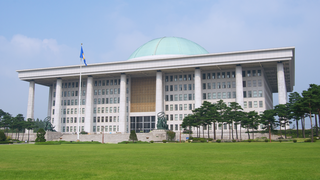
| Legal status of persons |
|---|
 |
| Birthright |
| Nationality |
| Immigration |
Loss of citizenship, also referred to as loss of nationality, is the event of ceasing to be a citizen of a country under the nationality law of that country.

| Legal status of persons |
|---|
 |
| Birthright |
| Nationality |
| Immigration |
Loss of citizenship, also referred to as loss of nationality, is the event of ceasing to be a citizen of a country under the nationality law of that country.
Citizenship can be lost in a variety of different ways. In a study of the nationality laws of thirty-three European countries, the European Union Democracy Observatory found nine broadly-defined cases in which a citizen of a country may lose his or her citizenship. [1]
Citizenship can be lost voluntarily through renunciation. A person might renounce their citizenship in order to take up another citizenship.
Citizenship can be lost involuntarily through denaturalization, also known as deprivation or forfeiture. A person might have their citizenship revoked in this way due to:
Children can sometimes lose their citizenship at the same time as their parent doing so, just as they might acquire citizenship at the same time as their parent. Children may also lose their citizenship following adoption by a foreigner or other changes in relation to their parents such as annulment of maternity/paternity.
Finally, citizenship can be lost through a variety of other grounds, that are often not clearly voluntary or involuntary. One action that is taken voluntarily (e.g. serving in a foreign military) can lead to a subsequent involuntary loss. [2] Some of these grounds include:
Such loss of citizenship may take place without the knowledge of the affected citizen, and indeed without the knowledge of the government. Until the government's officials (e.g. embassy staff) are informed, the government may continue to retain the person's name in its citizenship records. [3] [4]
Countries may have legal provisions to prevent the loss of citizenship, particularly where the loss would make the person stateless.
These provisions often stem from international treaties that prevent governments from making people stateless, as well as limiting individual's ability to voluntarily make themselves stateless. [5] Article 7 of the Convention on the Reduction of Statelessness provides that "[l]aws for the renunciation of a nationality shall be conditional upon a person's acquisition or possession of another nationality". However, this is not considered a peremptory norm which binds non-signatories to the Convention.
Most countries have provisions that allow for renunciation and denaturalization.
The following countries have provisions for loss of citizenship that go beyond the norm:

Canadian nationality law details the conditions by which a person is a national of Canada. The primary law governing these regulations is the Citizenship Act, which came into force on February 15, 1977 and is applicable to all provinces and territories of Canada.

United States nationality law details the conditions in which a person holds United States nationality. In the United States, nationality is typically obtained through provisions in the U.S. Constitution, various laws, and international agreements. Citizenship is established as a right under the Constitution, not as a privilege, for those born in the United States under its jurisdiction and those who have been "naturalized". While domestic documents often use the words citizenship and nationality interchangeably, nationality is a broader term that refers to national identity and formal membership in a nation, while citizen is reserved to nationals who are have the recognized status of citizenship.
Nationality law is the law of a sovereign state, and of each of its jurisdictions, that defines the legal manner in which a national identity is acquired and how it may be lost. In international law, the legal means to acquire nationality and formal membership in a nation are separated from the relationship between a national and the nation, known as citizenship. Some nations domestically use the terms interchangeably, though by the 20th century, nationality had commonly come to mean the status of belonging to a particular nation with no regard to the type of governance which established a relationship between the nation and its people. In law, nationality describes the relationship of a national to the state under international law and citizenship describes the relationship of a citizen within the state under domestic statutes. Different regulatory agencies monitor legal compliance for nationality and citizenship. A person in a country of which he or she is not a national is generally regarded by that country as a foreigner or alien. A person who has no recognised nationality to any jurisdiction is regarded as stateless.

South Korean nationality law (Korean: 국적법) details the conditions in which an individual is a national of the Republic of Korea (ROK), commonly known as South Korea. Foreign nationals may naturalize after living in the country for at least five years and showing proficiency in the Korean language. All male citizens between the ages of 18 and 35 who are able-bodied and mentally competent are required to perform at least 18 months of compulsory military service or alternative civilian service.

Belgian nationality law provides for the conditions in which a person holds Belgian nationality and is based on a mixture of the principles of jus sanguinis and jus soli.

Denaturalization is the loss of citizenship against the will of the person concerned. Denaturalization is often applied to ethnic minorities and political dissidents. Denaturalization can be a penalty for actions considered criminal by the state, often only for errors in the naturalization process such as fraud. Since the 9/11 attacks, the denaturalization of people accused of terrorism has increased. Because of the right to nationality, recognized by multiple international treaties including Article 15 of the Universal Declaration of Human Rights, denaturalization is often considered a human rights violation.

The citizenship law of the Czech Republic is based on the principles of jus sanguinis or "right by blood". In other words, descent from a Czech parent is the primary method of acquiring Czech citizenship. Birth on Czech territory without a Czech parent is in itself insufficient for the conferral of Czech citizenship. Every Czech citizen is also a citizen of the European Union. The law came into effect on 1 January 1993, the date of the dissolution of Czechoslovakia, and has been amended in 1993, 1995, 1996, 1999, 2002, 2003, and 2005. Since 1 January 2014, multiple citizenship under Czech law is allowed.

Slovenian nationality law is based primarily on the principles of jus sanguinis, in that descent from a Slovenian parent is the primary basis for acquisition of Slovenian citizenship. However, although children born to foreign parents in Slovenia do not acquire Slovenian citizenship on the basis of birthplace, place of birth is relevant for determining whether the child of Slovenian parents acquires citizenship.

Japanese Nationality Law details the conditions by which a person holds nationality of Japan. The primary law governing nationality regulations is the 1950 Nationality Act.

Nationality law of Greece is based on the principle of jus sanguinis. Greek citizenship may be acquired by descent or through naturalization. Greek law permits dual citizenship. A Greek national is a citizen of the European Union, and therefore entitled to the same rights as other EU citizens.
Renunciation of citizenship is the voluntary loss of citizenship. It is the opposite of naturalization, whereby a person voluntarily obtains citizenship. It is distinct from denaturalization, where citizenship is revoked by the state.

Ukrainian nationality law details the conditions by which a person holds nationality of Ukraine. The primary law governing these requirements is the law "On Citizenship of Ukraine", which came into force on 1 March 2001.

The Mongolian nationality law is a nationality law that determines who is a citizen of Mongolia.

Azerbaijani nationality law is regulated by the Constitution of Azerbaijan, as amended; the Citizenship Law of Azerbaijan and its revisions; and various international agreements to which the country is a signatory. These laws determine who is, or is eligible to be, an Azerbaijani national.
Multiple citizenship is a person's legal status in which a person is at the same time recognized by more than one country under its nationality and citizenship law as a national or citizen of that country. There is no international convention that determines the nationality or citizenship status of a person, which is consequently determined exclusively under national laws, that often conflict with each other, thus allowing for multiple citizenship situations to arise.

Thai nationality law includes principles of both jus sanguinis and jus soli. Thailand's first Nationality Act was passed in 1913. The most recent law dates to 2008.

Under United States federal law, a U.S. citizen or national may voluntarily and intentionally give up that status and become an alien with respect to the United States. Relinquishment is distinct from denaturalization, which in U.S. law refers solely to cancellation of illegally procured naturalization.

Maldivian nationality law is contained in the provisions of the Maldivian Citizenship Act and in the relevant provisions of the Constitution of the Maldives. A person may be a citizen of the Republic of the Maldives through birth, descent, marriage to a Maldivian citizen or through naturalisation.

Mozambican nationality law is regulated by the Constitution of Mozambique, as amended; the Nationality Law and Nationality Regulation, and their revisions; and various international agreements to which the country is a signatory. These laws determine who is, or is eligible to be, a national of Mozambique. The legal means to acquire nationality, formal legal membership in a nation, differ from the domestic relationship of rights and obligations between a national and the nation, known as citizenship. Nationality describes the relationship of an individual to the state under international law, whereas citizenship is the domestic relationship of an individual within the nation. Mozambican nationality is typically obtained under the principle of jus soli, i.e. by birth in the territory, or jus sanguinis, i.e. by birth in Mozambique or abroad to parents with Mozambican nationality. It can be granted to persons with an affiliation to the country, or to a permanent resident who has lived in the country for a given period of time through naturalization.

São Toméan nationality law is regulated by the Constitution of São Tomé and Príncipe, as amended; the Nationality Law, and its revisions; and various international agreements to which the country is a signatory. These laws determine who is, or is eligible to be, a national of São Tomé and Príncipe. The legal means to acquire nationality, formal legal membership in a nation, differ from the domestic relationship of rights and obligations between a national and the nation, known as citizenship. Nationality describes the relationship of an individual to the state under international law, whereas citizenship is the domestic relationship of an individual within the nation. São Toméan nationality is typically obtained under the principles of jus soli, i.e. by birth in the territory, or jus sanguinis, i.e. by birth in São Tomé and Príncipe or abroad to parents with São Toméan nationality. It can be granted to persons with an affiliation to the country, or to a permanent resident who has lived in the country for a given period of time through naturalization.